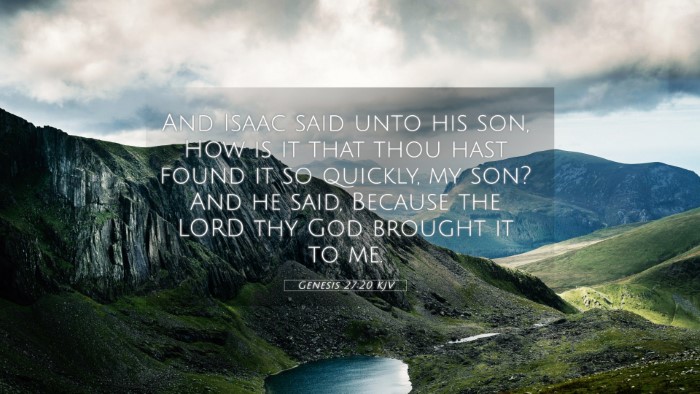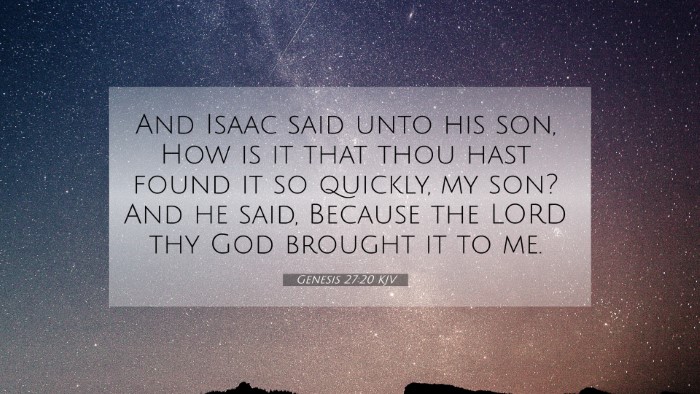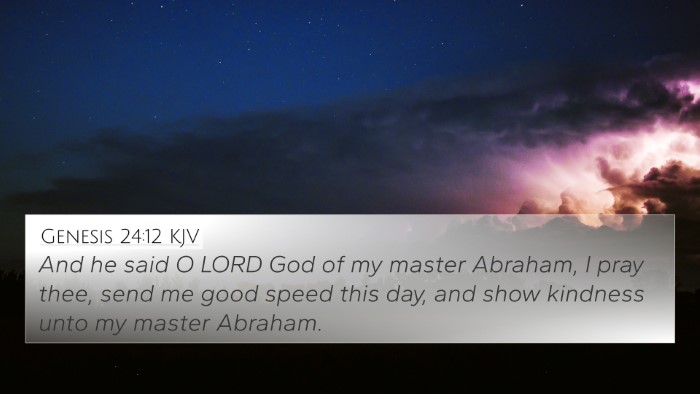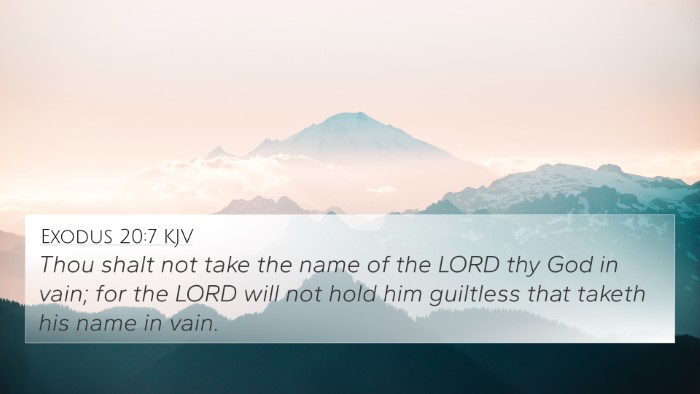Understanding Genesis 27:20
Verse Overview: Genesis 27:20 states, "And Isaac said unto his son, How is it that thou hast found it so quickly, my son? And he said, Because the LORD thy God brought it to me." This moment occurs during the narrative where Jacob deceives his father Isaac to receive the blessing intended for Esau, his brother. The verse evokes themes of divine providence and human agency.
Contextual Background
The story of Jacob and Esau is pivotal in understanding the history of Israel, illustrating the complex dynamics of family, deception, and the fulfillment of God's promises. This particular verse embodies a moment of tension and divine intervention.
Commentary Insights
We draw from notable public domain commentaries to unpack the richness of Genesis 27:20:
- Matthew Henry: Henry emphasizes the apparent contradiction between Isaac's question and Jacob's response. He suggests that while Isaac is puzzled by the swiftness of Jacob's actions, Jacob attributes his success to divine assistance. This highlights both human ingenuity and God's sovereignty.
- Albert Barnes: Barnes focuses on the implications of Jacob's claim that the LORD had brought him the game. He notes that Jacob's remark could imply a belief in divine favor, but also a troubling aspect of lying in the pursuit of blessings, which raises moral questions about how we seek God's favor.
- Adam Clarke: Clarke discusses the relationship between Isaac and Jacob, noting that Isaac’s uncertainty reflects his increasing blindness—both literal and metaphorical. Clarke suggests that this moment foreshadows greater conflict within the family, representing the fulfillment of prophecy regarding the elder serving the younger.
Thematic Connections
Genesis 27:20 offers substantial thematic connections across the Bible, underscoring divine intervention in human affairs. The following Bible verses relate similarly to this theme:
- Genesis 24:27 - Discusses the Lord's guidance in arranging a marriage for Isaac through divine means.
- Exodus 3:12 - God promises Moses that He will be with him, showing His presence in human missions.
- 1 Samuel 10:7 - Validation of God's words, emphasizing His direction in significant moments.
- Romans 8:28 - A New Testament affirmation that all things work together for good, for those who love God.
- Proverbs 16:9 - Affirms the belief that while humans plan their paths, it is ultimately the Lord who directs their steps.
- Esther 4:14 - Highlights the providential placement of Esther to fulfill God’s purpose, mirroring Jacob's circumstances.
- John 14:13-14 - Assures believers that God honors requests made in the name of Jesus, emphasizing divine responsiveness.
Cross-Referencing Biblical Texts
When studying Genesis 27:20, consider the interconnected nature of Scripture:
Cross-Reference Techniques
Utilizing a Bible cross-reference guide can significantly enhance the comprehension of Scripture. Utilize tools such as a Bible concordance or a comprehensive Bible cross-reference system to explore thematic ties and parallels in Biblical narratives.
Application and Reflection
Genesis 27:20 invites reflection on the broader themes of trust, deception, and divine providence. When analyzing Scripture, ask:
- What does this passage reveal about God's plans in the face of human actions?
- How do the actions of Jacob reflect our own attempts to control outcomes?
- What does this verse teach about the nature of blessings and the means of receiving them?
Conclusion: Embracing the Complexity of Scripture
Genesis 27:20 serves as a reminder of the rich tapestry of narratives woven throughout the Bible. Through the lens of cross-referencing, we uncover deeper meanings and connections between verses, illustrating the ongoing dialogue within Scripture. Engaging with the complexities of these texts enables a greater understanding of God's workings within human history.
In your study, consider how inter-Biblical dialogue enriches your faith and understanding. Use tools for Bible cross-referencing to support your journey through the Word.





